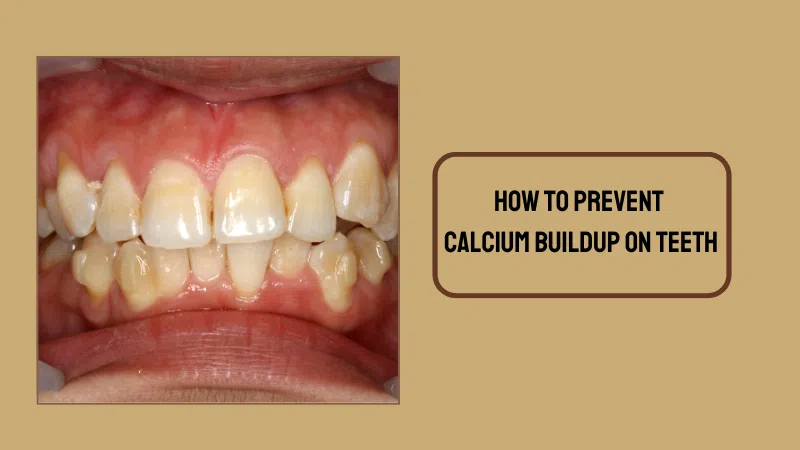Brentwood: (615) 235-1966

How to Prevent Calcium Buildup on Teeth
Brentwood, TN

Have you ever noticed stubborn white or yellow deposits clinging to your teeth despite your best brushing efforts? These could be calcium deposits, also known as tartar or calculus. While they might seem like a purely aesthetic concern, calcium buildup can pose a threat to your oral health. But fear not! This blog post equips you with the knowledge and practical strategies to prevent these unwanted minerals from settling on your pearly whites, keeping your smile bright and healthy.
Let’s explore the causes and symptoms of calcium buildup and, most importantly, discover how to prevent it. By incorporating these simple yet effective tips into your daily routine, you can maintain a healthy mouth and avoid the need for more intensive treatments down the line.
Understanding Calcium Buildup:
Calcium is a crucial mineral for building strong teeth and bones. However, when minerals like calcium and phosphate in your saliva mix with food debris and bacteria in your mouth, they form a sticky film called plaque. Brushing and flossing regularly remove plaque. But if left unchecked, plaque hardens over time, transforming into the dreaded calcium deposits.
Causes and Symptoms of Calcium Buildup:
Several factors contribute to calcium buildup. Sipping sugary drinks throughout the day feeds the bacteria in plaque, accelerating its growth. Dry mouth, a condition that reduces saliva flow, can also contribute by allowing plaque to linger on teeth for longer periods. Genetics can also play a role, with some individuals naturally more prone to developing tartar.
Early signs of calcium buildup might be subtle, like a change in the texture of your teeth or a slight discoloration. As deposits accumulate, they become more noticeable and can irritate your gums, causing inflammation and redness. In severe cases, calcium buildup can lead to gum disease, a serious condition that affects the tissues supporting your teeth.
Removing Calcium Deposits:
Unfortunately, once calcium deposits have formed, brushing and flossing alone won’t remove them. If you suspect you have tartar buildup, a visit to your dentist’s office is essential. They have the tools and expertise to remove these deposits safely through professional cleaning, often called scaling. This procedure is painless and typically takes only one or two appointments, depending on the severity of the buildup.
Scaling: Scaling involves the use of specialized tools to eliminate calcium deposits and plaque from your teeth physically. Nowadays, dentists and dental hygienists commonly utilize ultrasonic scrapers, which are instruments vibrating at a very high rate while shooting water to eliminate tartar.
Polishing: Polishing follows scaling, where your dentist or hygienist smoothes out rough areas of enamel, providing a final deep clean. This not only enhances your smile’s appearance but also eliminates rough areas that could attract bacterial buildup.
Scaling and root planning: In more challenging cases, scaling and root planning may be necessary. This involves more extensive work to remove calcium deposits further below the gum line, around the roots of teeth, and surrounding bone.
Typically, scaling and polishing procedures for removing calcium deposits are not painful. However, if gum disease is present or if deep cleaning, such as scaling and root planing, is required at the tooth’s root, a local anesthetic may be necessary.
Prevention is Key: Strategies for a Calcium Buildup-Free Smile
The good news is that you can significantly reduce your risk of developing calcium buildup with a proactive approach. Here’s your roadmap to a tartar-free future:
Brushing Basics: Brushing your teeth twice a day for two minutes each time is the cornerstone of good oral hygiene. Use a soft-bristled toothbrush and fluoride toothpaste to remove plaque and prevent buildup effectively. Pay particular attention to areas where tartar commonly accumulates, such as the gum line and the backs of your teeth.
Floss Like a Boss: Flossing once a day reaches those hard-to-reach areas between your teeth where plaque and bacteria love to hide. Regular flossing disrupts their cozy haven, preventing them from forming deposits.
Dietary Choices for a Healthy Smile: Limiting sugary and starchy foods like candy, cookies, and white bread reduces the fuel source for plaque-forming bacteria. Instead, focus on incorporating calcium-rich foods like dairy products, leafy greens, and nuts into your diet. These foods not only provide essential minerals for strong teeth but can also stimulate saliva production, which helps wash away food debris.
Hydration Hero: Drinking plenty of water throughout the day keeps your mouth lubricated, naturally flushing away food particles and preventing plaque buildup. Aim for eight glasses of water daily for optimal oral health.
Regular Dental Checkups: Schedule regular dental checkups and cleanings with your dentist in Brentwood, typically twice a year. These visits allow for early detection of calcium buildup and other potential dental issues, enabling prompt intervention if necessary.
Maintaining a Winning Smile: Beyond Prevention
If you have concerns about calcium buildup or other dental issues, don’t hesitate to schedule an appointment with your Brentwood dentist. They will be happy to answer your questions, provide personalized guidance, and help you achieve optimal oral health. After all, a healthy smile is a beautiful smile, and a beautiful smile can brighten your day and the days of those around you.


